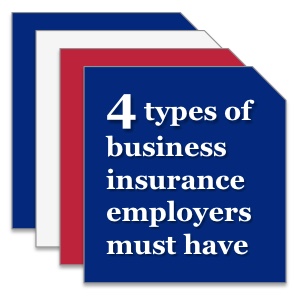 You’re about to become an employer. Maybe you’ve been in business for a while, but now you’re ready to hire your first employee. You’re excited; this means your business is growing. Or, maybe you’re just starting a business and you need employees to help run that business.
You’re about to become an employer. Maybe you’ve been in business for a while, but now you’re ready to hire your first employee. You’re excited; this means your business is growing. Or, maybe you’re just starting a business and you need employees to help run that business.
Either way, being an employer comes with many responsibilities, including ensuring that you purchase the right business insurance. You may be asking yourself, “What insurance is required by law and what is optional? What’s in the best interest of both my business and my employees?”
There are four primary types of insurance every employer should take a look at – Workers Compensation Insurance, Unemployment Insurance Tax, Disability Insurance, and Health Insurance.
Workers’ Compensation Insurance
Workers Compensation Insurance coverage ensures medical and wage-loss benefits to employees who are injured on the job. Plus, it helps protect employers against lawsuits filed by injured workers. Worker’s Comp insurance requirements vary by state. In Pennsylvania, if you employ one or more employees - whether they’re part-time or full-time (including family members) workers’ compensation insurance coverage is mandatory.
If you are a sole proprietor, Workers' compensation insurance is not required by law, which can save you money; however, if you’re ever injured on the job, workers’ compensation insurance can help pay medical bills and supplement lost wages until you’re able to go back to work.
Click here for information about workers compensation insurance requirements in other states.
Unemployment Insurance Tax
Unemployment Insurance (UI) is a joint state and federal program financed through federal and state employer payroll taxes. It provides temporary payments to individuals who are unemployed through no fault of their own. Each state has its own unemployment insurance program, which includes additional eligibility requirements, but they all follow guidelines established by the federal government.
Most employers must pay federal employer payroll taxes if they pay employee wages of $1,500, or more, in a quarter or if they have at least one employee during 20 weeks in a calendar year. Most employers are also required to pay state unemployment taxes. In Pennsylvania, all employers providing employment to one or more workers must register Form PA-100 with the Office of UC Tax Services.
Employment that is not covered under the UC law includes the following:
- An individual employed by his or her son, daughter or spouse
- A child under the age of 18 who is employed by his or her parent
- A student in the employ of an organized camp that did not operate more than seven months in the preceding calendar year
Disability Insurance
Some states require that employers provide partial wage replacement insurance coverage to their eligible employees for non-work related sickness or injury. Currently, if your employees are located in any of the following states, you are required to purchase disability insurance:
- California
- Hawaii
- New Jersey
- New York
- Puerto Rico
- Rhode Island
In Pennsylvania, there are two types of disability insurance available if you decide to purchase it for your employees: short-term and long-term.
Again, if you are a sole proprietor, Disability Insurance is not required in Pennsylvania; however, if your family relies on your income, you may want to consider disability insurance for yourself to help pay medical bills and supplement lost wages if you become sick or injured.
Health Insurance
If you have more than 50 employees you are required to provide health insurance benefits to your full-time employees. If you have more than 50 employees and don’t offer health benefits, you may be subject to a penalty call the shared responsibility payment. 96% of employers in Pennsylvania are exempt from the shared responsibility requirement.
 Contact Us for All Your Business Insurance Needs
Contact Us for All Your Business Insurance Needs
If you’re an employer, contact American Insuring Group at (800) 947-1270 or (610) 775-3848 for more information about required and recommended business insurance, including health insurance, disability insurance, workers compensation insurance, or any other insurance your business may need. We've been helping businesses like yours acquire affordable, high-quality insurance for over 25 years.



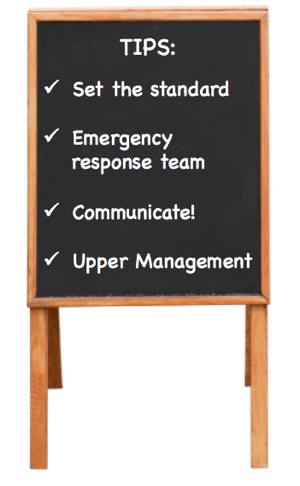 Set the Standard
Set the Standard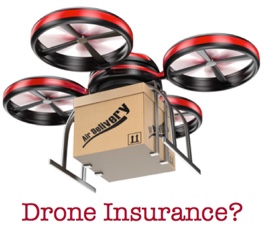 Businesses are discovering many uses for drones – also known as unmanned aircraft systems (UAS). In fact, total spending for military and commercial drones is expected to reach $89.1 billion over the next ten years. This translates into approximately 30,000 small commercial drones in use by 2020, according to the Federal Aviation Administration (FAA).
Businesses are discovering many uses for drones – also known as unmanned aircraft systems (UAS). In fact, total spending for military and commercial drones is expected to reach $89.1 billion over the next ten years. This translates into approximately 30,000 small commercial drones in use by 2020, according to the Federal Aviation Administration (FAA).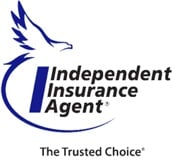 In February 2012, congress mandated that the Federal Aviation Administration (FAA) find a way to integrate drones into U.S. airspace by September 2015. With that deadline looming, the FAA is nowhere close to finalizing its plans. This lack of regulation and the fact that there is very little loss history available at this point makes it challenging for insurance companies to develop policies. It's therefore likely that drone insurance rates may vary widely among insurance providers. Therefore, it's helpful to acquire drone insurance protection from an
In February 2012, congress mandated that the Federal Aviation Administration (FAA) find a way to integrate drones into U.S. airspace by September 2015. With that deadline looming, the FAA is nowhere close to finalizing its plans. This lack of regulation and the fact that there is very little loss history available at this point makes it challenging for insurance companies to develop policies. It's therefore likely that drone insurance rates may vary widely among insurance providers. Therefore, it's helpful to acquire drone insurance protection from an  For more information about drone insurance and other commercial insurance needs,
For more information about drone insurance and other commercial insurance needs, 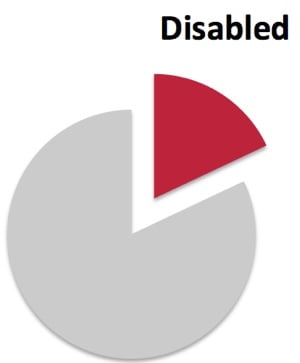 More than 50 million Americans – 18% of the population – have disabilities, making them the largest minority group in the country. In addition, approximately 71.5 million baby boomers will be over the age of 65 by the year 2030; many will require special provisions to meet their age-specific physical needs.
More than 50 million Americans – 18% of the population – have disabilities, making them the largest minority group in the country. In addition, approximately 71.5 million baby boomers will be over the age of 65 by the year 2030; many will require special provisions to meet their age-specific physical needs.  If you own a fleet of vehicles that are used exclusively for your business or you own a freight truck or delivery truck, you probably understand that you need commercial vehicle insurance on those vehicles. But what if you have one vehicle that you use to deliver pizzas? What if you use your personal vehicle to drive to job sites or to meetings?
If you own a fleet of vehicles that are used exclusively for your business or you own a freight truck or delivery truck, you probably understand that you need commercial vehicle insurance on those vehicles. But what if you have one vehicle that you use to deliver pizzas? What if you use your personal vehicle to drive to job sites or to meetings?
 Whether you’re a subcontractor or a general contractor – whether you build small backyard sheds or giant commercial buildings – whether you’re a one-man remodeling business or a multi-million dollar construction company, there are three types of insurance you need to consider. In other words, the size of your business and the size of the project make little difference. If you want to protect your investment, your employees, and even your business, there are three types of
Whether you’re a subcontractor or a general contractor – whether you build small backyard sheds or giant commercial buildings – whether you’re a one-man remodeling business or a multi-million dollar construction company, there are three types of insurance you need to consider. In other words, the size of your business and the size of the project make little difference. If you want to protect your investment, your employees, and even your business, there are three types of  For more customized information about your construction insurance or
For more customized information about your construction insurance or  Every employer is responsible for insuring a safe working environment for his or her employees. If you’re in construction, workplace safety should move to the top of your priorities because more than 20% of the work-related fatalities in 2013 occurred in the construction industry.
Every employer is responsible for insuring a safe working environment for his or her employees. If you’re in construction, workplace safety should move to the top of your priorities because more than 20% of the work-related fatalities in 2013 occurred in the construction industry. 
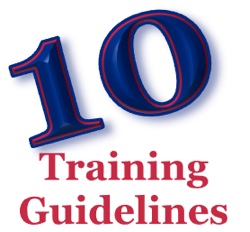 On average, thirteen Americans are killed on the job every single day of the year and nearly 4 million workers are seriously injured on the job each year. Under the Occupational Safety and Health (OSH) Act, employers are responsible for providing a safe working environment. Furthermore, employers “MUST provide their workers with a workplace that doesn’t have serious hazards and must follow all OSHA safety and health standards.”
On average, thirteen Americans are killed on the job every single day of the year and nearly 4 million workers are seriously injured on the job each year. Under the Occupational Safety and Health (OSH) Act, employers are responsible for providing a safe working environment. Furthermore, employers “MUST provide their workers with a workplace that doesn’t have serious hazards and must follow all OSHA safety and health standards.”  Get the Right Workers Compensation Insurance Protection
Get the Right Workers Compensation Insurance Protection Thirty-nine percent of households have dogs, so it’s no surprise that more companies – including Google, Etsy, and Build-A-Bear Workshop – are allowing employees to bring their dogs to work. After all, Congress has been dog friendly since the 19th century. And, according to a survey conducted by the American Pet Products Manufacturers, 17 percent of Americans work at pet-friendly companies. What are the benefits? What are the risks? Does your business insurance adequately cover the risks? You should know the answers to these questions before implementing a pet-friently workplace policy.
Thirty-nine percent of households have dogs, so it’s no surprise that more companies – including Google, Etsy, and Build-A-Bear Workshop – are allowing employees to bring their dogs to work. After all, Congress has been dog friendly since the 19th century. And, according to a survey conducted by the American Pet Products Manufacturers, 17 percent of Americans work at pet-friendly companies. What are the benefits? What are the risks? Does your business insurance adequately cover the risks? You should know the answers to these questions before implementing a pet-friently workplace policy. Contact Us for the Right Business Insurance Protection to Support a Pet-Friendly Workplace
Contact Us for the Right Business Insurance Protection to Support a Pet-Friendly Workplace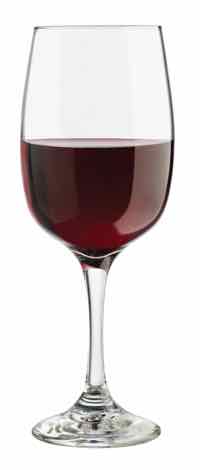 Let’s say you own a restaurant. One night, a group of friends enjoy dinner and a few drinks at your restaurant. They decide to go to a club where they dance and consume more alcohol. Then, they go to a corner pub to wind down with a few more drinks. On the way home, one of those friends causes an accident that injures or – God forbid – kills someone in the process.
Let’s say you own a restaurant. One night, a group of friends enjoy dinner and a few drinks at your restaurant. They decide to go to a club where they dance and consume more alcohol. Then, they go to a corner pub to wind down with a few more drinks. On the way home, one of those friends causes an accident that injures or – God forbid – kills someone in the process.



